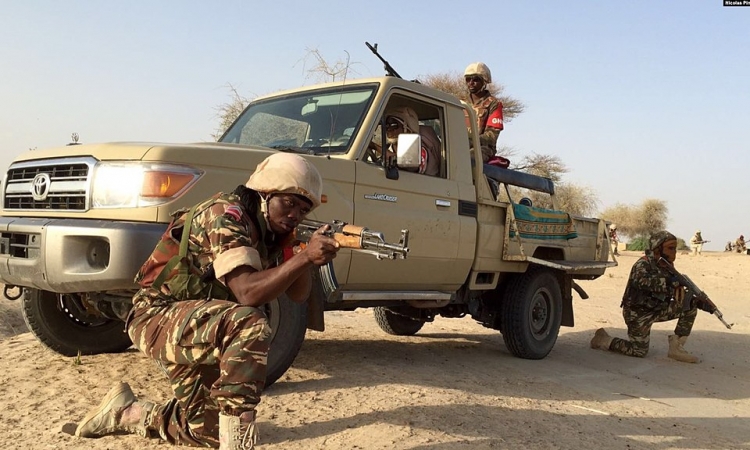FATF reports, UN Security Council Resolutions and Reports of the Secretary-General on the threat posed by ISIL (Da’esh) to International Peace and Security, as well as jurisdictions and news media listed below, have highlighted the link between human trafficking and terrorist organisations. Trafficking flows related to armed conflict can include human trafficking within and into conflict-affected areas for the purposes of domestic servitude, sexual slavery, forced recruitment, forced labour and forced marriage.
These reports also indicate that terrorist organisations who have controlled, or partially controlled territory, have used human trafficking as a way to raise funds and support to their organisations and activities:
ISIL: The UN reported that Yazidi women were being bought and sold by ISIL fighters in ‘slave auctions’, including via the internet. The 2015 FATF report on ISIL financing noted that the prices paid for ISIL slaves were low (approximately USD 13 each), and have been reported to be transferred between ISIL fighters as commodities. The UN Human Rights Council has stated that some Yazidi women and girls were aware of the amounts paid for them, which ranged between USD 200 and USD 1 500, depending on marital status, age, number of children, and perceived beauty. There were also media reports of payments being made to intermediaries to free Yazidi women from captivity. The UN reports that in January 2016, ISIL received USD 850 000 in payments from Yazidi families for the return of 200 kidnapping victims, and that estimates suggested that in 2014 ISIL earned between USD 35 million to USD 45 million in payments from the Yazidi community. The US State Department has found that in Syria, ISIL used displaced children as forced labour in organised begging rings.
Boko Haram: The UN has noted that Boko Haram uses children as beggars to raise funds. It found that Boko Haram has kidnapped thousands of women and girls to date and some of these women have been subjected to domestic servitude, forced labour, and sex slavery through forced marriages to its militants.
Al-Shabaab: Based on interviews with victims, the Somali Financial Intelligence Unit (FIU) suspects that Al-Shabaab members have been involved in the trafficking of Somalis for profit. The accounts of two victims highlighted that this has occurred both from rural to urban areas within Somalia, and from Somalia to other countries. Typically, women have been promised work opportunities but their salaries have been paid directly to the Al-Shabaab. It is not clear if this has occurred in an organised fashion to raise funds for the group or if the trafficking is for the personal benefit of individual terrorists.
There have also been many accounts of numerous terrorist organisations profiting from the exploitation of vulnerable persons in their areas of control, including by forcing young men and boys to fight for the terrorist organisation.
Fewer reports exist of terrorist organisations profiting off of the facilitation or allowance of human trafficking networks within their territory; however, such a link may be present given the well-reported proclivity of territory-controlling terrorist organisations to tax all activity occurring within their borders.
While there are indications that human trafficking may be a source of income for terrorist groups, particularly those that control territory, this appears not to be a key source of revenue for terrorist groups, especially considering the erosion of the territory held by terrorist groups. However, human trafficking is likely used as a tool to exploit and control vulnerable local populations, as a perceived benefit for fighters in conflict, and as an occasion to secure ransom payments. The involvement of terrorists in human trafficking is likely opportunistic and could be for the benefit of individual terrorists or for the terrorist organisation at large.
Links between human trafficking, migrant smuggling and kidnap for ransom
Terrorist organisations influence trafficking flows by engaging in armed conflict which causes mass migration and increases the number of displaced persons, thereby increasing the number of persons vulnerable to human trafficking. These individuals may be more susceptible to seeking the services of migrant smuggling networks, or be vulnerable to exploitation through human trafficking networks, which can utilise similar infrastructure or channels.
Several jurisdictions have noted that migrant smuggling due to conflict may turn into a human trafficking scenario, particularly if the victim is kept in debt-bondage until the fees for migrant smuggling operation are paid. Similarly, migrant smuggling or human trafficking scenarios can turn into a kidnap for ransom scenario if ransom is demanded from the family members to free the individual. It is not always clear if these payments are for the benefit of terrorist organisations that have territorial control. In one situation, a family member was asked to use a certain money service business provider to make the ransom payment. This suggests that terrorist groups have developed ways to hide and transfer ransom payments made from other countries.
IMAGE CREDIT: Wikimedia Commons / Nicolas Pinault (VOA) [Public domain]

